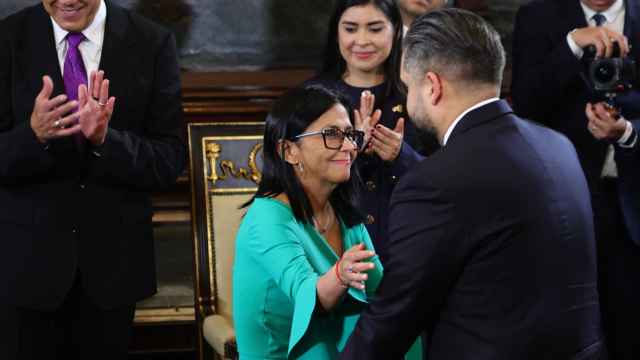Western reaction is important since Ukraine, a major grain and steel exporter, badly needs outside investment and is negotiating a free trade deal with the European Union.
After about an hour of wrangling on Wednesday, Tymoshenko's hearing was adjourned until Monday, July 4.
Wearing her trademark peasant-style hair braid, the 50-year-old political firebrand was in typically combative mood, accusing the judge of being in Yanukovych's pocket and refusing to cooperate with court formalities.
Asked by Judge Rodion Kireyev to identify herself to the Kiev court, she curtly retorted: "I gave you my passport. Read it yourself."
Tymoshenko, who lost a bitter election battle for the presidency against Yanukovych in February 2010, says the court action is part of a vendetta by her rival.
"Everything that is happening today is political revenge," she said, denouncing the court as a "department of the presidential administration."
"Their [the presidential administration] aim is to isolate me from being able to unite the people of Ukraine," she said.
The prosecution says Tymoshenko, who was twice prime minister, abused her power in the signing of a 2009 gas import agreement with Russia.
It says that, without consulting her government, she forced the then-head of state-owned Naftogaz to sign the gas deal with Gazprom. Tymoshenko denies this.
The 2009 accord ended a gas-pricing dispute with Russia that had led to cuts in supplies of gas to parts of Western Europe along pipelines that pass through Ukraine.
The current administration, which took over after Tymoshenko lost her bid for the presidency in 2010, says the agreement was a sellout of national interests, though it is abiding by its terms.
Tymoshenko said over the weekend that she faced a jail term of seven to 10 years. Some close to her expect her to be given a suspended sentence, which would still limit her ability to be politically active in opposition.
A separate case is pending against Tymoshenko over purported misuse of government funds received in exchange for emission quotas sold to Japan under the Kyoto Protocol.
Since Yanukovych came to power, several of Tymoshenko's former associates have been prosecuted on charges of offenses in office and at least one has fled Ukraine.
Western governments have not come down publicly on her side. But visiting politicians from the European Union have told the Yanukovych leadership they are concerned over the possible use of selective justice.
Tymoshenko became known as the "gas princess" in the late 1990s as owner of a company that bought and sold Russian gas.
Her fiery oratory and glamorous style turned her into an international figure in 2004 when she led the Orange Revolution street demonstrations that ultimately doomed Yanukovych's first bid for the presidency.
She went on to serve two terms as prime minister under President Viktor Yushchenko, her Orange Revolution ally.
But early last year, with many people disillusioned by the Orange leadership and infighting between Tymoshenko and Yushchenko, Yanukovych emerged victorious in the election.
While still highly popular in many parts of the country, Tymoshenko has failed to unite other opposition politicians around her.
A Message from The Moscow Times:
Dear readers,
We are facing unprecedented challenges. Russia's Prosecutor General's Office has designated The Moscow Times as an "undesirable" organization, criminalizing our work and putting our staff at risk of prosecution. This follows our earlier unjust labeling as a "foreign agent."
These actions are direct attempts to silence independent journalism in Russia. The authorities claim our work "discredits the decisions of the Russian leadership." We see things differently: we strive to provide accurate, unbiased reporting on Russia.
We, the journalists of The Moscow Times, refuse to be silenced. But to continue our work, we need your help.
Your support, no matter how small, makes a world of difference. If you can, please support us monthly starting from just $2. It's quick to set up, and every contribution makes a significant impact.
By supporting The Moscow Times, you're defending open, independent journalism in the face of repression. Thank you for standing with us.
Remind me later.






